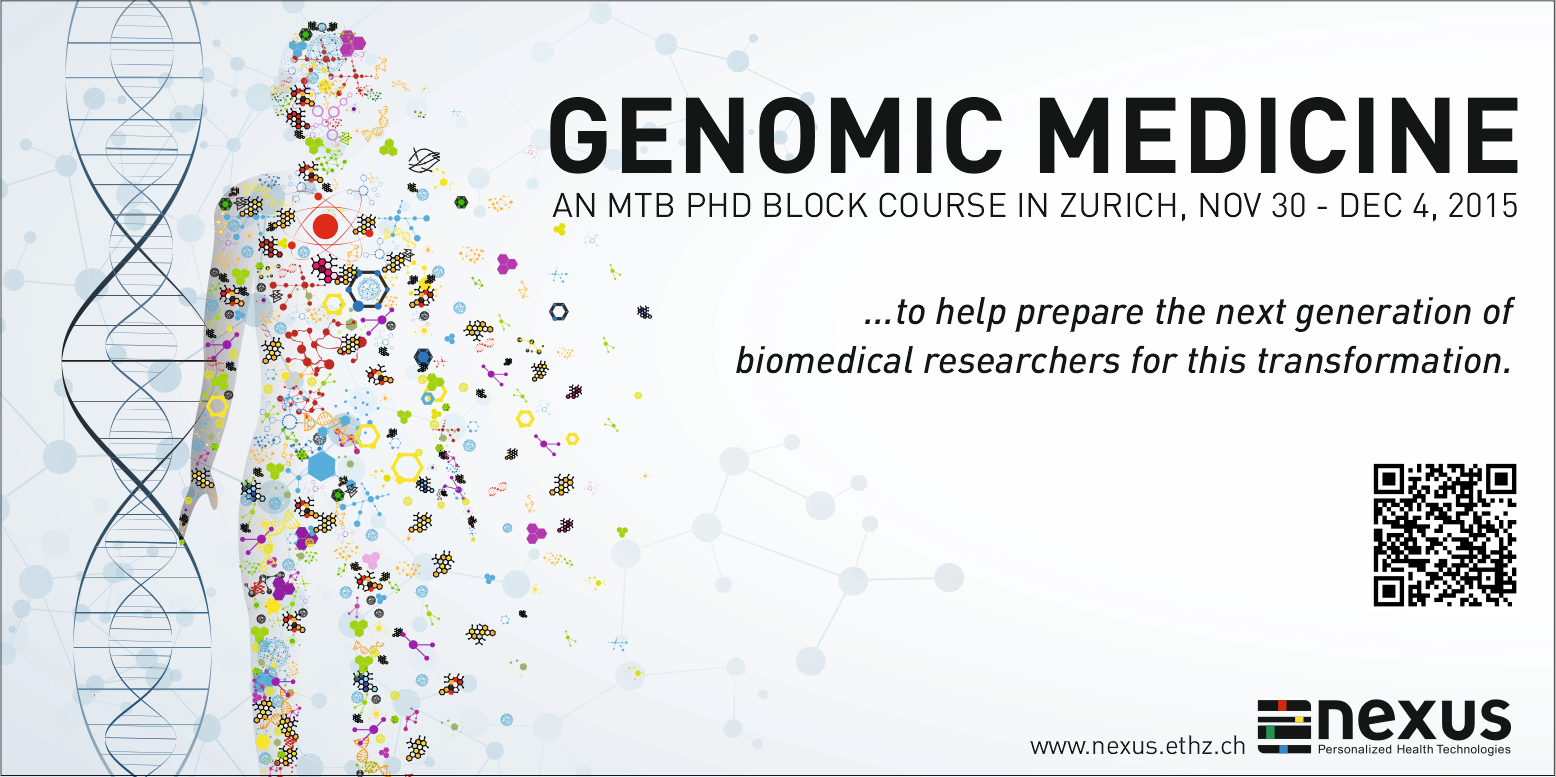PhD Course in Genomic Medicine 2015
Abstract
Genomic technologies are not only changing the way biomedical research is performed, but they also have an increasing impact on medical diagnostics and treatment. However, using genomic data in a clinical setting is challenging. It requires an interdisciplinary approach, including knowledge of the measurement technologies, of computational and statistical methods for analyzing the data they produce, and of clinical procedures to translate the results into improved healthcare.
This new 1-week PhD block course on "Genomic Medicine" has been designed to help preparing the next generation of clinical and biomedical researchers for this transformation. It addresses clinical as well as basic biomedical and computational scientists. The goal of the course is to provide a broad overview of Genomic Medicine and to prepare participants to contribute to Genomic Medicine in interdisciplinary teams.
Content
The course covered the following topics:
- Omics technologies
- Computational and statistical analysis of omics data
- Biomarker discovery
- Reproducibility
- Genomic clinical trials
- Precision medicine: genome-based treatment optimization
- Ethical and legal aspects of Genomic Medicine
- Commercial applications of Genomic Medicine
- Genomic Medicine case studies: cancer, HIV, multiple sclerosis, rare diseases
Prerequisites
None.
Credit Points
Upon successful completion of the performance assessment, students received 2 ECTS credit points.
Performance Assessment
During the week students worked in small groups on selected Genomic Medicine research papers. They solved tasks, presented and discussed their results on the last day in front of the plenum.
Date & Location
Mon, November 30 to Fri, December 4, 2015
Main Building ETH Zurich, HG F 26.1 and in University Hospital Zurich, PATH D 15, entry from Schmelzbergstrasse 8 (only Friday morning)
The course ended on Friday with a site visit of the external pageInstitute of Clinical Pathologycall_made, the external pageLaboratory for High-Throughput Genomicscall_made of the University Hospital Zurich and a networking apéro in the Uhrenhalle.
Lecturers

Student Tasks
Task Titles & Papers
- Reproducibility, Baggerly & Coombs, 2009
- Genome-wide Association Studies, Bush & Moore, 2012
- Ethics of Genome Editing (CRISPR/Cas9), Cyranoski, 2015 and Lander, 2015 - external pageNature News, 2015call_made
- Clinical Trial, Eggermont et al., 2015
- Molecular Profiling of Omics Data, Crosetto et al., 2015
- Genomic Data Analysis, Fischer et al., 2014
- Cancer Personalized Medicine, Simon & Roychowdhury, 2015
- Genomics Expert Systems in HIV, Zazzi et al., 2011 and Rosen-Zvi et al., 2008
- Companion Diagnostics, Scher et al., 2011
Other resources
- GWAS Task: external pageeasyGWAS websitecall_made
Literature
- Baggerly, K. A., & Coombes, K. R. (2009). Deriving chemosensitivity from cell lines: Forensic bioinformatics and reproducible research in high-throughput biology. The Annals of Applied Statistics, 1309-1334.
- Bush, W. S., & Moore, J. H. (2012). Chapter 11: Genome-wide association studies. PLoS Comput Biol, 8(12), e1002822.
- Crosetto, N., Bienko, M., & van Oudenaarden, A. (2015). Spatially resolved transcriptomics and beyond. Nature Reviews Genetics, 16(1), 57-66.
- Cyranoski, D. (2015). Ethics of embryo editing divides scientists. Nature, 519(7543), 272-272.
- Eggermont, A. M., Chiarion-Sileni, V., Grob, J. J., Dummer, R., Wolchok, J. D., Schmidt, H., ... & Testori, A. (2015). Adjuvant ipilimumab versus placebo after complete resection of high-risk stage III melanoma (EORTC 18071): a randomised, double-blind, phase 3 trial. The Lancet Oncology, 16(5), 522-530.
- Fischer, A., Vázquez-García, I., Illingworth, C. J., & Mustonen, V. (2014). High-definition reconstruction of clonal composition in cancer. Cell reports, 7(5), 1740-1752.
- Lander, E. S. (2015). Brave New Genome. New England Journal of Medicine, 373(1), 5-8.
- Rosen-Zvi, M., Altmann, A., Prosperi, M., Aharoni, E., Neuvirth, H., Sönnerborg, A., ... & Lengauer, T. (2008). Selecting anti-HIV therapies based on a variety of genomic and clinical factors. Bioinformatics, 24(13), i399-i406.
- Scher, H. I., Nasso, S. F., Rubin, E. H., & Simon, R. (2011). Adaptive clinical trial designs for simultaneous testing of matched diagnostics and therapeutics. Clinical Cancer Research, 17(21), 6634-6640.
- Simon, R., & Roychowdhury, S. (2013). Implementing personalized cancer genomics in clinical trials. Nature reviews Drug discovery, 12(5), 358-369.
- Zazzi, M., Kaiser, R., Sönnerborg, A., Struck, D., Altmann, A., Prosperi, M., ... & Incardona, F. (2011). Prediction of response to antiretroviral therapy by human experts and by the EuResist data‐driven expert system (the EVE study). HIV medicine, 12(4), 211-218.

